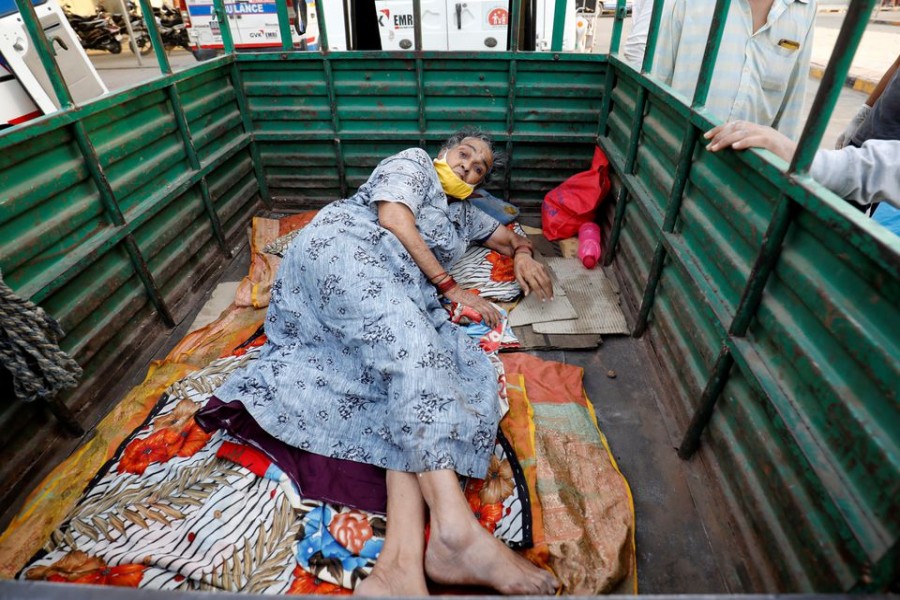Vital medical supplies poured into India on Tuesday as hospitals starved of oxygen supplies and beds turned away coronavirus patients, while a surge in infections pushed the death toll towards 200,000, reports Reuters.
Supplies from Britain, including 100 ventilators and 95 oxygen concentrators, arrived in Delhi, said Reuters partner ANI, while France is sending oxygen generators able to provide 250 patients with a year's supply of the gas, its embassy said.
Even China, locked in a year-long military standoff with India on their disputed Himalayan border, said it was trying to get medical supplies to its neighbour.
"We will encourage and guide Chinese companies to actively cooperate with India...," embassy spokesman Wang Xiaojian said in a statement on its website.
The first “Oxygen Express” train pulled into New Delhi, the capital, carrying about 70 tonnes of the life-saving gas from an eastern state, but the crisis has not abated in the city of 20 million at the epicentre of the latest wave of infections.
The shortage of oxygen is the main concern, said Dr K. Preetham, an administrator at the Indian Spinal Injuries Centre.
"For seven days, most of us haven't slept," he told Reuters. "Because of the scarcity, we are forced to put two patients on one cylinder."
India's 323,144 new cases over the past 24 hours stood below a worldwide peak of 352,991 hit on Monday, while 2,771 deaths took the toll to 197,894.
Fewer infections were largely due to a drop in testing, said health economist Rijo M John of the Indian Institute of Management in the southern state of Kerala.
"This should not be taken as an indication of falling cases, rather a matter of missing out on too many positive cases," he said on Twitter.
KUMBH CROWDS
Delhi is in lockdown until May 3, a measure adopted by the southern state of Karnataka and the worst-hit state of Maharashtra, although some states had been set to lift curbs this week.
The uneven curbs, complicated by local elections and mass gatherings such as the months-long Kumbh Mela, or pitcher festival, could drive breakouts elsewhere.
About 20,000 devout Hindus gathered on the banks of the Ganges river in the northern city of Haridwar on the last auspicious day of the festival for a bath they believe will wash away their sins.
"We believe Mother Ganga will protect us," said a woman on the riverbank, where Reuters images showed people bathing with few signs of distancing measures, despite calls to be careful.
Tuesday's turnout was low, however, said Sanjay Gunjyal, a police official handling the arrangements, compared to the hundreds of thousands in previous weeks, as the crisis prompted many monk groups to limit participants to "symbolic" numbers.
India has turned to its armed forces for help fighting the crisis as new infections have topped 300,000 since April 21.
Prime Minister Narendra Modi has urged all citizens to get vaccinated amid the "storm" of infections.
But in some of the worst-hit cities, bodies were being cremated in makeshift facilities in parks and parking lots while television channels showed images of bodies crammed into an ambulance in the western city of Beed as transport ran short.
'WORSE BEFORE IT GETS BETTER'
India has converted hotels and railway coaches into critical care facilities, but experts warn the next crisis will be a shortage of healthcare professionals.
"Unfortunately beds do not treat patients - doctors, nurses and paramedics do," said Devi Shetty, a cardiac surgeon and chairman of the Narayana Health chain of hospitals.
The Indian Medical Association said private hospitals would have to shut in Surat, a centre of the diamond trade in the western state of Gujarat, if they did not get oxygen supplies soon.
"We fear a law-and-order situation might ensue," it added.
Companies ranging from conglomerates such as Tata Group and Reliance Industries Ltd to Jindal Steel and Power have stepped forward to help supply medical oxygen.
The U.S. Chamber of Commerce has warned that the Indian economy, the world's sixth largest, could falter as a result of the spike in cases, creating drag for the global economy.
“We expect that this could get worse before it gets better,” said its vice president, Myron Brilliant.
Australia halted direct passenger flights from India until May 15, joining a growing list of nations adopting curbs to keep out more virulent variants.
VACCINE UNCERTAINTY
India, with a population of about 1.3 billion, has a tally of 17.64 million infections, but experts believe it runs much higher.
Vaccine demand has outpaced supply, partly because of a shortage of raw materials and a fire at a facility making the AstraZeneca shot.
Supply uncertainty could force the western state of Maharashtra to postpone the inoculation of those aged between 18 and 45, a government official said. India had planned to allow vaccination for all adults from May.
India is negotiating with the United States, which has said it will share 60 million doses of AstraZeneca's COVID-19 vaccine with other countries.
“Major lobbying is on...to secure as much as possible,” a senior official participating in the talks told Reuters, adding that Modi had been assured of priority for India.


